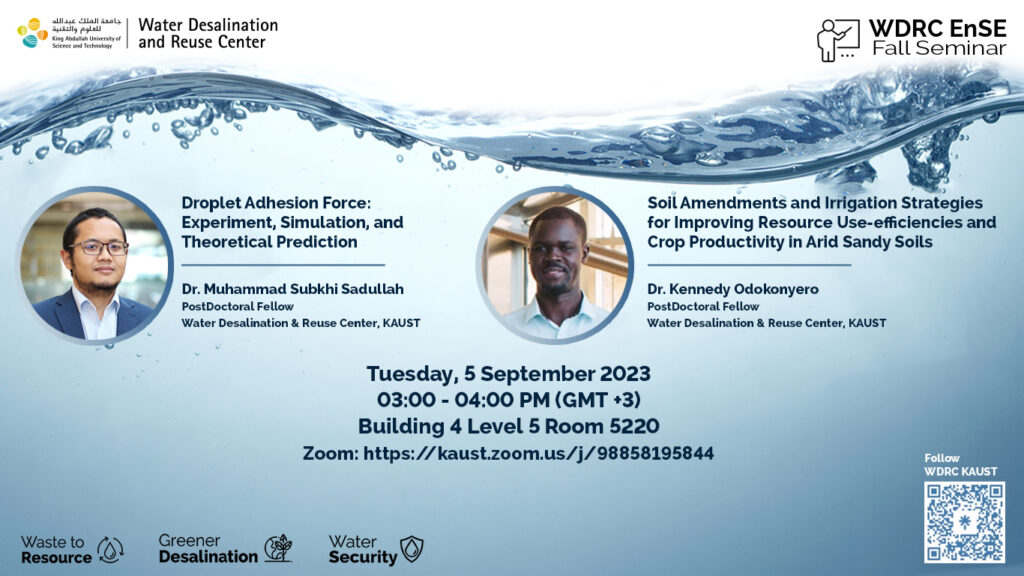
Droplet Adhesion Force: Experiment, Simulation, and Theoretical Prediction
By Dr. Muhammad Subkhi Sadullah, Postdoctoral fellow, WDRC, KAUST
Tuesday, September 5, 2023
3:00 – 3:30 p.m.
On Zoom
Abstract
How much force is needed to detach a tiny droplet from a surface? Remarkably, this fundamental question has no simple answer, even though it is relevant in numerous natural and applied contexts, e.g., fog harvesting and designing windshields and fabrics. We answer this long-standing question via comprehensive laboratory and computational experiments. The results demonstrate that the Young–Laplace equation can accurately predict the droplet detachment force. When challenged against experiments with liquids of varying properties and droplet sizes, the predictions are in excellent quantitative agreement, detaching from smooth and microtextured surfaces of wetting and non-wetting chemical make-ups.
About the speaker
Subkhi is a postdoctoral fellow at WDRC, King Abdullah University of Science and Technology. He obtained his Ph.D. in Physics from Durham University, UK. His research interests focus on wetting and interfacial phenomena. At KAUST, he employs experimental, computational, and theoretical approaches to study the physics of solid-liquid interfaces. In particular, he is interested in the applications of wetting phenomena, including liquid-repellent surfaces, oil-water separation, fog-harvesting surfaces, and capillary adhesion.
Soil Amendments and Irrigation Strategies for Improving Resource Use-efficiencies and Crop Productivity in Arid Sandy Soils
By Dr. Kennedy Odokonyero, Postdoctoral fellow, WDRC, KAUST
Tuesday, September 5, 2023
3:30 – 4:00 p.m.
On Zoom
Abstract
Irrigation plays a vital role toward food-water security of the growing population in arid and semi-arid regions. The kingdom of Saudi Arabia is an arid landmass characterized by hot and dry climate, and poor-quality soils (with annual rainfall of <100 mm), which hinder crop productivity. Compounded by the effects of unsustainable freshwater withdrawals for irrigation, excessive evaporative loss of water and nutrient-deficient sandy soils present a threat to the food−water security situation in arid regions. To improve crop productivity, the development and deployment of innovative and sustainable technologies is necessary to enhance the use-efficiencies of water and nutrient resources. In response to these challenges, our group developed two complementary soil amendment technologies: a Superhydrophobic sand mulch (SandXTM) and a Biochar (CarboSoilTM) customized for sandy soils. In this seminar, I will present the findings from our translational research and highlight the synergies between soil amendment technologies and irrigation strategies for optimal plant growth. I will also pinpoint the challenges involved during the research transition from controlled to field-scale studies for the arid land context.
About the speaker
Dr. Kennedy Odokonyero obtained a Ph.D. in Agricultural Science and a Graduate Certificate of Research from the University of Tasmania in Australia (2017) and an MSc. in Agro-environmental Management from Aarhus University in Denmark (2013). He worked as a Ph.D. Fellow at the International Center for Tropical Agriculture (CIAT) in Colombia and held a Visiting Research Scientist position at the Biosciences Eastern and Central Africa-International Livestock Research Institute (BeCA-ILRI) in Nairobi, Kenya. His research interests lie within plant-soil-microbial interactions to improve plant resilience to environmental stresses and improve yields under changing climatic scenarios. Kennedy joined Prof. Himanshu Mishra’s team as a postdoc in 2018 and has been instrumental in driving translational research efforts on soil amendment technologies for improving soil and plant health under varying irrigation regimes.

